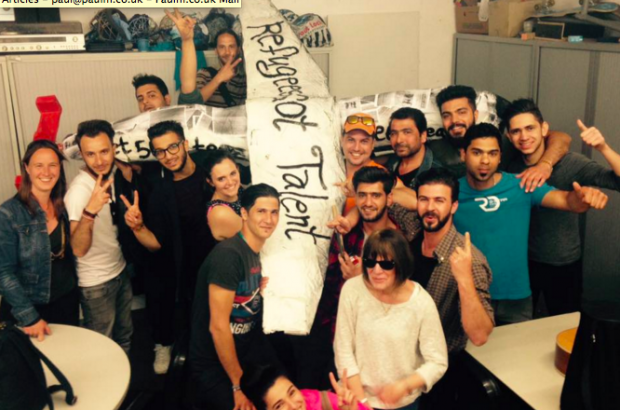- Daily & Weekly newsletters
- Buy & download The Bulletin
- Comment on our articles
Two Brussels organisations helping refugees integrate and be independent
With so many people escaping to Europe from conflicts that are tearing apart countries such as Syria, Afghanistan, Iraq and Libya, the issue of refugee integration is a hot topic on the political agenda.
While debate continues on how to best deal with the ongoing refugee crisis, some organisations and volunteer groups in Brussels are steaming ahead in their quest to make life easier for refugees and ensure they have a better life upon reaching sanctuary.
The Bulletin spoke to two such local organisations that help refugees and immigrants cope with daunting transitions and difficult adjustments.
Duo for a Job: Mentoring immigrants and refugees
“We have a wide variety of people coming here with different education levels and a wide variety of skills,” says Julie Bodson, project co-ordinator with Brussels-based Duo for a Job.
Founded in 2012, Duo for a Job facilitates intergenerational mentoring for young refugees and immigrants, whom they refer to as mentees. They are paired with semi-retired local professionals, mentors, who help mentees find work, usually over a six-month period.
Mentors are usually in early retirement and must possess strong experience in the Brussels business sector, so they can pass on their knowledge and experience to the mentee. Mentees themselves have to be able to proficiently speak either French, Dutch or English as well as demonstrate a genuine willingness to work.
It is not easy for refugees though, as they have certain formalities to complete before they can look for work. According to Duo for a Job, 42% of their mentees do not have recognised diplomas, which can add to difficulties.
"They have to be able to speak the languages here, they need a residence, they may have trouble getting the required documents or qualifications from their countries and it may take a long time to have their qualifications recognised,” says Bodson.
She added that even if qualifications are recognised, they may not be viewed on an equal level: "For example a doctor from Congo may only be recognised as being on the same level as a nurse in Belgium."
The organisation's mentors represent more than 30 sectors. A mentor is paired with a mentee who is looking for a job in that same sector. Bodson lists certain areas experiencing labour shortages such as IT, nursing, education, food services and civil engineering.
"These people come with skills but don't know how to adapt these to the requirements of the local job market. In Brussels it might be more formal, so talking with mentors might give the mentees the chance to translate their skills to the local market."
Duo for a Job also provides a range of services such as workspace for mentees and mentors, computers, mock interviews, access to HR specialists to revise cover letters and CVs as well as speech therapy classes.
"We discovered that some refugees had a good level of French but the pronunciation is different in their language," explains Bodson. "The speech therapist teaches them how to physically pronounce words. It gives them great confidence and can influence how they are perceived."
From more than 300 pairings, there has been a 76% success rate, says Bodson, with 91% of mentees satisfied with their experience and 96% of mentors renewing their association.
"Mentees say they gain autonomy and have extra tools for their job search," she adds.
Refugees Got Talent: Helping migrants integrate through art
For some refugees arriving in Belgium, their way of integrating and communicating in their new home is through art. Refugees Got Talent was founded in January 2016 by five friends: Belgians Sophie Querton, Julie Artus and Aurelie Beer and Iraqi English teachers Falah Mustafa and Ahmed Fawaz.
"We opened a space with artistic material to offer refugees the opportunity to practise their art again," explains Querton. "Art is universal. It has no language and no religion. It’s neutral and can help build bridges."
Twice a week, normally on Fridays and Saturdays, artists, painters, sculptors, calligraphists, musicians, actors and comedians get together to practice their skills and exchange ideas. This forges relationships between artists from different countries and regions such as Syria, Iraq, Iran, Tunisia, Kurdistan, Morocco and others.
"It is very quiet and respectful here where our artists can come and work together. It’s very important for them as this unfortunately may not be the case in the camps where they live," says Querton.
In addition, Refugees Got Talent gives artists the chance to get involved in the Brussels arts and culture scene and work with local artists. One such event that Querton highlighted was Music for Social Harmony in July 2016. It featured musicians from Refugees Got Talent performing alongside local musicians to promote social harmony through music.
“It was great to compare local art with what our artists do. This is something we look to do,” says Querton.
Like other volunteer organisations, funding is an issue of critical importance, especially as they pay for the artists’ materials and their transport costs, as refugees come from all over Belgium to attend.
The group recently completed a crowdfunding campaign through the platform Kisskissbankbank, raising more than €15,000. They also get funding from the King Baudouin Foundation.
Querton says efforts to seek finances will keep going: "We’re all volunteers, so in order to sustain the project we’ll be applying for subsidies. We’ll also be organising large art exhibitions in September and December, selling the artists’ works. We’ll keep a part of the sales to continue the project."
She adds: "They will feel proud that they earn money from selling their works. If you push them to become more independent, they better integrate."
Querton has high hopes for the group’s future and is looking to expand its size and stature: "We’re getting bigger and we are always open to new artists to join us and enrich our team."









